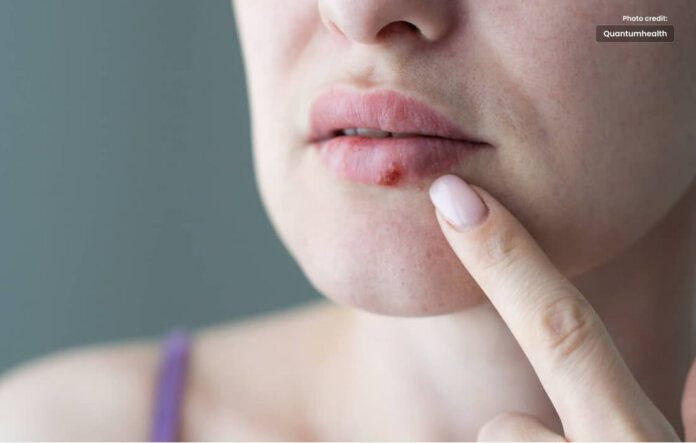Cold sores, painful blisters around lips, afflict millions worldwide.
Caused by the herpes simplex virus (HSV-1), cold sores can be both physically uncomfortable and emotionally distressing. However, fear not! In this blog, we’ll explore some of the most effective treatments and home remedies for cold sores, helping you conquer these pesky nuisances and get back to feeling your best.
Understanding Cold Sores: Causes and Symptoms
Before we delve into the treatments, let’s understand the basics of cold sores. Cold sores are caused by the highly contagious herpes simplex virus, which enters the body through small breaks in the skin, usually around the mouth. The primary symptoms of cold sores include:
- Tingling or burning sensation: Often, a tingling or burning sensation occurs in the affected area a day or two before the actual blister appears.
- Small blisters: These fluid-filled blisters emerge around the lips, mouth, or nose. They can be painful and typically last for 7-10 days.
- Crusting and healing: The blisters eventually break open, ooze fluid, and form a crust. As the cold sore heals, the crust falls off, leaving behind pinkish skin that eventually returns to normal.
Effective Cold Sore Treatments:
-
Over-the-Counter (OTC) Antiviral Creams:
Topical antiviral creams containing ingredients like acyclovir, docosanol, or penciclovir can help shorten the duration of cold sores and alleviate discomfort. Apply the cream as soon as you feel the initial tingling sensation for the best results.
-
Oral Antiviral Medication:
In more severe cases or for individuals with recurrent cold sores, doctors may prescribe oral antiviral medications such as acyclovir, valacyclovir, or famciclovir. These medications can speed up healing and reduce the frequency of outbreaks.
-
Pain Relievers:
Over-the-counter pain relievers like ibuprofen or acetaminophen can help manage the pain and inflammation associated with cold sores.
-
Cold Compress:
Applying a cold compress to the affected area can provide temporary relief from pain and help reduce swelling.
-
Avoid Triggers:
Certain triggers can provoke cold sore outbreaks, such as stress, fatigue, excessive sun exposure, or a weakened immune system. Identifying and avoiding these triggers can help prevent recurrent cold sores.
Home Remedies for Cold Sores:
In addition to medical treatments, several home remedies can help soothe cold sores and promote healing:
- Aloe Vera Gel: Known for its soothing properties, applying aloe vera gel to the cold sore can reduce pain and inflammation.
- Honey: Honey possesses natural antiviral and antibacterial properties. Dab a small amount of honey on the cold sore to aid healing.
- Tea Tree Oil: The antiviral properties of tea tree oil can help combat the herpes simplex virus. Dilute tea tree oil with a carrier oil and apply it to the cold sore.
- Lysine Supplements: Lysine is an amino acid that may help suppress the herpes simplex virus. Taking lysine supplements regularly or consuming lysine-rich foods like dairy products, fish, and legumes may be beneficial.
- Lemon Balm Extract: Lemon balm contains compounds that have antiviral properties. Applying lemon balm extract or cream to cold sores can speed up the healing process.
Preventing Cold Sores:
While there’s no foolproof way to prevent cold sores, you can reduce the risk of outbreaks by following these tips:
- Maintain Good Hygiene: Wash your hands frequently, especially when you have an active cold sore, to prevent spreading the virus to other areas or to others.
- Protect Your Lips: Use a lip balm containing sunscreen to shield your lips from harmful UV rays, as sun exposure can trigger cold sore outbreaks.
- Strengthen Your Immune System: A healthy immune system can help keep the herpes simplex virus in check. Maintain a balanced diet, get regular exercise, and manage stress effectively.
- Avoid Close Contact During Outbreaks: To prevent spreading the virus to others, avoid close contact, kissing, or sharing personal items like utensils, towels, or lip products during a cold sore outbreak.
While these can be bothersome, they are a common condition that can be managed effectively. By using the appropriate treatments and taking preventative measures, you can minimize their impact on your life and enjoy a cold-sore-free existence. Remember, if you experience severe or recurrent outbreaks, consult a healthcare professional for personalized advice and treatment options.
Disclaimer:
The information provided in this blog is for educational purposes only and should not be considered medical advice. Always consult a healthcare professional for proper diagnosis and treatment of any health condition.




